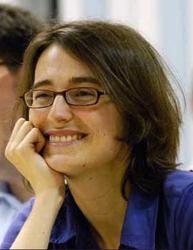Dozentenstipendium: Research award for Outstanding Max-Planck research group leader
Melanie Schnell was awarded the prestigious Dozentenstipendium of the Fonds der Chemischen Industrie (FCI) on Thursday 03. Mai 2012.
Dr. Melanie Schnell, independent Max-Planck research group leader at the Center for Free-Electron Laser Science in Hamburg and at the Max-Planck-Institut für Kernphysik in Heidelberg, is awarded a Dozentenstipendium of the Fonds der Chemischen Industrie (FCI). The FCI awards this prize to outstanding younger researchers. The Dozentenstipendium contains 35.000 Euro research support and an annual prize money of 7.500 Euro. The Dozentenstipendium lasts for a maximum of 5 years, but at most until the awardee obtains a call for a W3 chair.
Melanie Schnell, born in 1978, studied chemistry at the universities of Hannover and Bonn (1997-2002) and obtained her PhD in Physical Chemistry in 2004. She then moved on for a postdoctoral position at the National Institute for Standards and Technology (NIST) in Maryland, USA. In 2005, she returned to Germany, to the Fritz-Haber-Institut of the Max-Planck-Gesellschaft in Berlin (department of molecular physics). There, she initially worked as a postdoctoral fellow and then took over her own research group which was funded by a Liebig grant of the FCI. Since October 2010 Melanie Schnell leads an independent Max-Planck research group which is jointly hosted by the Center for Free-Electron Laser Science (CFEL) in Hamburg and the Max-Planck-Institut für Kernphysik in Heidelberg. Dr. Schnell’s research concentrates on investigations on structure and dynamics of complex molecules and molecular complexes in the gas phase. She is applying the novel broadband rotational spectroscopy technique and develops new methods to obtain full control over molecules (deceleration and trapping experiments).
Melanie Schnell obtained several prizes for her research: for example she was awarded the Akademiestipendium of the Berlin-Brandenburgische Akademie der Wissenschaften in 2005, and she was appointed as Woodward-Lecturer in the Physical Chemistry Seminar of the Harvard University in 2006. From 2006-2011, she was an elected member of Die Junge Akademie.
Further information:
http://fonds.vci.de/
http://mpg.cfel.de/asg/sdccm/
